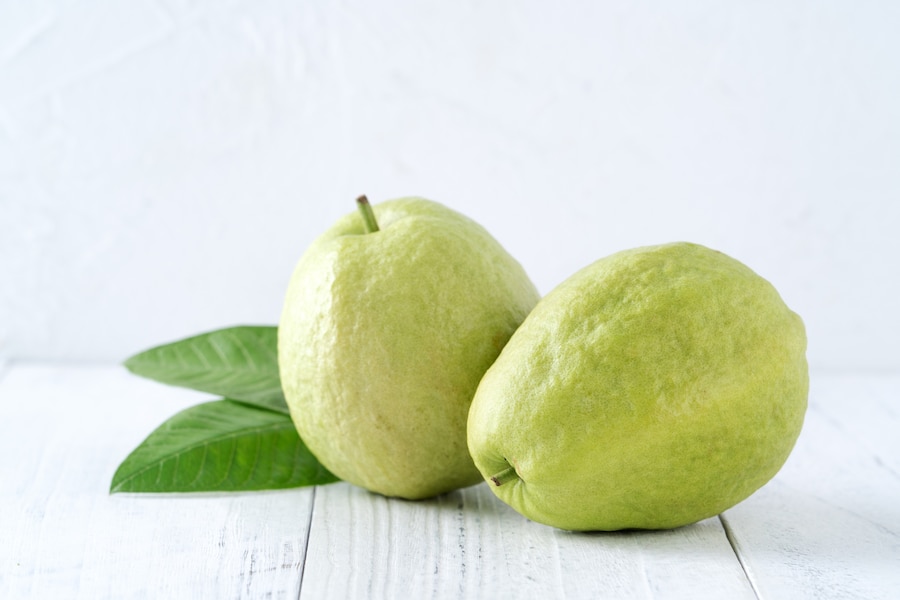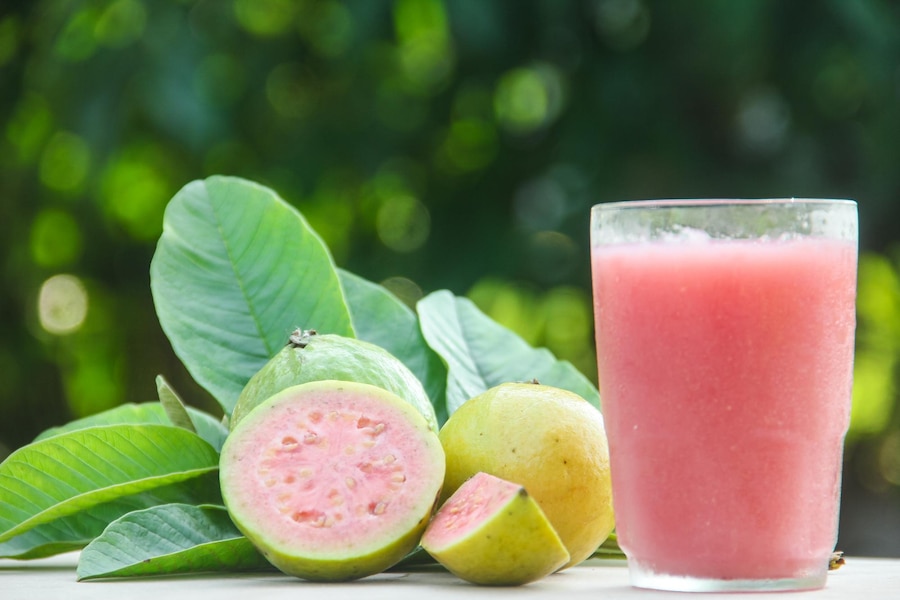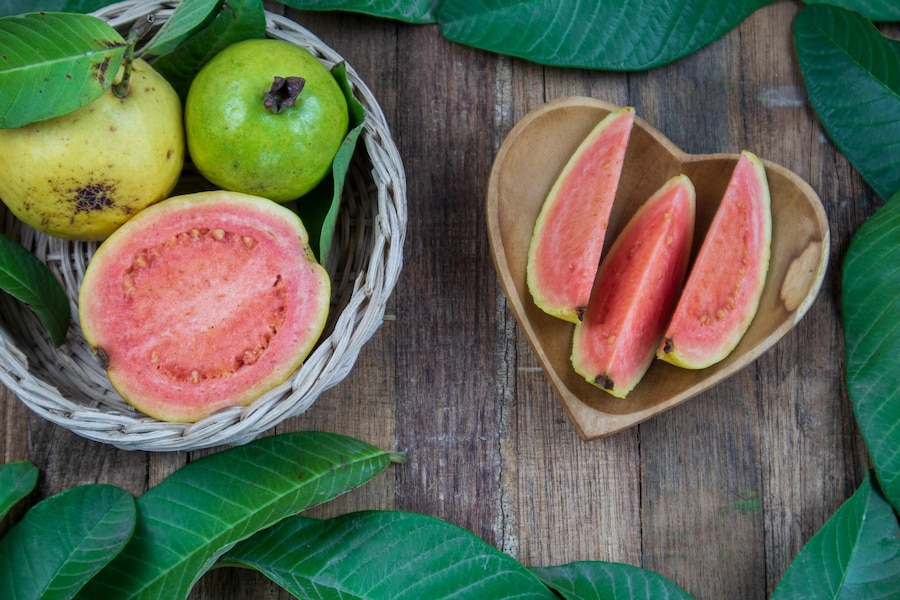Have you ever tried guava? Let’s explore the numerous benefits and of this unique tropical fruit, which hails from Mexico.
Guava is an exotic fruit that is gaining popularity for its remarkable health benefits and distinct flavor. Unlike more common fruits like pineapples or bananas, guava (also known as guayaba) is not as readily available in grocery stores. This tropical fruit comes from the tree Psidium guajava L., which is native to Mexico and Central America. Nowadays, it is cultivated in various warm regions with tropical climates, including parts of Italy.
One of the fascinating aspects of guava is the numerous varieties available, each possessing its own nutritional profile, making it worth trying at least once.
Guava: What Is It?
Guava is a tropical fruit primarily found in Mexico, the Caribbean, and certain areas of Central and South America. It grows on three types of trees belonging to the myrtle family: Psidium guajava (producing tropical guava), Psidium cattleianum, and Acca sellowiana.
As cultivation of guava has expanded, many hybrid varieties have emerged.
What Does Guava Taste Like?
If you’re curious about guava’s flavor, the answer is complex. Many assume it tastes like a mix of strawberries and pears, but in reality, each variety offers unique flavor notes and subtle distinctions; no two types taste exactly alike. The flesh can vary from white to vibrant pink, containing small, edible seeds. This fruit is not only delicious but is also high in vitamins A, C, and dietary fiber.
Guava: Nutritional Values
Most studies investigating guava’s benefits focus on the leaves rather than the fruit itself.
Rich in phenolic compounds, guava leaves possess antibacterial properties that can help ward off infections like candida and staphylococcus. However, these leaves are primarily used for medicinal purposes and are not typically consumed raw like the fruit.
From a nutritional standpoint, guava is a delectable tropical fruit that boasts high levels of vitamin C and dietary fiber. It is low in calories, with a medium fruit containing just 37 kcal. In addition to vitamin C and fiber, guava is packed with antioxidants, magnesium, potassium, calcium, and vitamin A.
Here are the nutritional values for every 100 grams:
- 112 calories
- 4 grams of protein
- 1.5 grams of total fat
- 24 grams of carbohydrates
- 9 grams of fiber
- 15 grams of sugar
- 376 milligrams of vitamin C
Guava: Benefits and Properties
Guava is loaded with antioxidants that combat inflammation and enhance heart health, digestion, and general wellness. Let’s explore the primary advantages of this tropical fruit.
Digestive Health
Guavas are an excellent source of dietary fiber. Studies suggest that consuming them can aid in regular bowel movements and help prevent constipation.
Additionally, research has indicated that guava leaf extract is antimicrobial, which means it can neutralize harmful microorganisms in the gut, potentially alleviating diarrhea.
Blood Sugar Management
There is some evidence that guava might be beneficial in regulating blood sugar levels.
Several studies have shown that guava leaf extract can enhance blood sugar levels, maintain long-term glucose control, and improve insulin resistance. A study involving 19 participants found that drinking guava leaf tea resulted in lower blood sugar levels after meals, with effects lasting up to two hours.
Weight Loss Aid
Guavas can assist in weight loss. With only 37 calories per fruit and providing 12% of your daily fiber recommendation, they serve as a filling and low-calorie snack. Unlike many low-calorie options, guavas are also nutrient-dense, rich in vitamins and minerals.
Heart Health Enhancement
Guavas may contribute to better heart health. Many experts believe that the high antioxidant and vitamin levels found in guava leaves could help protect the heart from free radical damage.
The elevated potassium and soluble fiber content in guavas is thought to support cardiovascular health as well. Guava leaf extract has also been associated with lower blood pressure, reduced “bad” LDL cholesterol, and increased “good” HDL cholesterol.
Given that high blood pressure and elevated LDL cholesterol levels correlate with a greater risk of heart disease and strokes, guava leaf extract could offer significant health advantages.
Immune System Support
Low vitamin C levels are linked to a higher likelihood of infections and diseases, but consuming guavas may help mitigate this risk, as they are one of the richest sources of vitamin C.
A single guava provides nearly double the Recommended Daily Intake (RDI) of vitamin C, which plays a vital role in maintaining a robust immune system, and studies indicate that vitamin C can shorten the duration of colds.
Skin Health
The diverse array of vitamins and antioxidants found in guava can greatly benefit your skin. Research has shown that its antioxidant properties can shield the skin from damage caused by free radicals, slowing aging and helping to prevent wrinkles.
Moreover, guava leaf extract can be effective against acne when applied topically. One study revealed that guava leaf extract effectively eliminated acne-causing bacteria, likely due to its antibacterial and anti-inflammatory properties.
How to Enjoy Guava

Guava can be enjoyed in various ways based on personal preference. Here are some ideas on how to savor this fruit:
- Raw: The simplest method is to eat guava raw. Wash it, cut it in half, and scoop out the pulp with a spoon. The seeds are edible, allowing you to eat them or discard them as you wish.
- Peeling: To peel guava, follow these steps:
- Wash the fruit thoroughly under running water.
- Cut off both ends of the guava.
- Make a lengthwise cut in the peel using a sharp knife.
- Carefully peel off the skin with your fingers or a knife.
- After peeling, slice or cube the guava for direct consumption or use in recipes.
- Juice or Smoothie: Guava can be blended to create delightful juices and smoothies. Simply peel and chop the fruit, then mix it with other ingredients such as bananas, oranges, or yogurt for a nutritious beverage.
- Cooked: Guava can also be cooked and incorporated into various dishes, including desserts, sauces, and jams. Cooking enhances its sweetness and versatility in culinary uses.
Guava Recipes

Here are five recipes featuring guava:
Guava and Banana Smoothie
- Ingredients: 2 ripe guavas, 1 banana, 1 cup plain yogurt, 1 tablespoon honey.
- Preparation: Peel and chop the guava and banana. Combine in a blender with yogurt and honey. Blend until smooth. Serve chilled.
Guava and Arugula Salad
- Ingredients: 2 guavas, 100 g arugula, 50 g feta cheese, 1 tablespoon chopped walnuts, olive oil, salt, pepper.
- Preparation: Thinly slice the guava. In a bowl, mix arugula, crumbled feta, and walnuts. Drizzle with olive oil, salt, and pepper. Gently add guava slices and toss.
Guava Jam
- Ingredients: 1 kg guava, 500 g sugar, juice of 1 lemon.
- Preparation: Peel and chop guava. In a saucepan, combine guava with sugar and lemon juice. Cook over medium heat, stirring continuously until thickened. Pour into sterilized jars and refrigerate.
Baked Guava with Honey and Cinnamon
- Ingredients: 4 guavas, 2 tablespoons honey, 1 teaspoon cinnamon powder.
- Preparation: Halve guavas and remove seeds. Place on a baking sheet, drizzle with honey and sprinkle with cinnamon. Bake at 180°C for 15-20 minutes until tender. Serve warm or cold.
Guava Cake
- Ingredients: 3 guavas, 200 g flour, 150 g sugar, 100 g butter, 2 eggs, 1 packet baking powder.
- Preparation: Preheat oven to 180°C. Peel and chop guavas. In a bowl, cream butter and sugar, then add eggs one at a time. Mix in sifted flour with baking powder, then fold in guavas. Pour into a greased pan and bake for 40-45 minutes. Cool before serving.
Where to Find Guava in Your City
In Italy, guava can be found at select supermarkets, especially in the sections dedicated to exotic fruits. Local markets, organic food stores, and specialty shops focusing on tropical produce are also excellent sources for purchasing guava. Additionally, various online exotic food retailers offer guava for sale.

